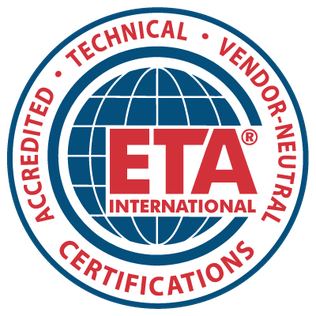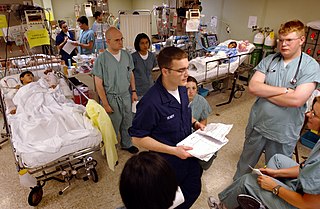Professional certification, trade certification, or professional designation, often called simply certification or qualification, is a designation earned by a person to assure qualification to perform a job or task. Not all certifications that use post-nominal letters are an acknowledgement of educational achievement, or an agency appointed to safeguard the public interest.
Regulation and licensure in engineering is established by various jurisdictions of the world to encourage life, public welfare, safety, well-being, then environment and other interests of the general public and to define the licensure process through which an engineer becomes licensed to practice engineering and to provide engineering professional services and engineered product to the public.

An engineering technologist is a professional trained in certain aspects of development and implementation of a respective area of technology. Engineering technology education is even more applied and less theoretical than engineering education, though in a broad sense both have a focus on practical application. Engineering technologists often assist engineers but after years of experience, they can also become engineers. Like engineers, areas where engineering technologists can work include product design, fabrication and testing. Also as with engineers, engineering technologists sometimes rise to senior management positions in industry or become entrepreneurs.
Engineering management is the application of the practice of management to the practice of engineering. Engineering management is a career that brings together the technological problem-solving ability of engineering and the organizational, administrative, legal and planning abilities of management in order to oversee the operational performance of complex engineering driven enterprises. A Master of Engineering Management (MEM) is sometimes compared to a Master of Business Administration (MBA) for professionals seeking a graduate degree as a qualifying credential for a career in engineering management.
The Project Management Institute is a U.S.-based not-for-profit professional organization for project management.

A medical laboratory scientist (MLS) or clinical laboratory scientist (CLS) or medical technologist (MT) performs diagnostic testing of blood and body fluids in clinical laboratories. The scope of a medical laboratory scientist's work begins with the receipt of patient or client specimens and terminates with the delivery of test results to physicians and other healthcare providers. The utility of clinical diagnostic testing relies squarely on the validity of test methodology. To this end, much of the work done by medical laboratory scientists involves ensuring specimen quality, interpreting test results, data-logging, testing control products, performing calibration, maintenance, validation, and troubleshooting of instrumentation as well as performing statistical analyses to verify the accuracy and repeatability of testing. Medical laboratory scientists may also assist healthcare providers with test selection and specimen collection and are responsible for prompt verbal delivery of critical lab results. Medical Laboratory Scientist in health settings also play an important role in the diagnosis of diseses conditions. An estimated 70% of medical decisions are based on laboratory test results and MLS contributions affect 95% of a health system's costs.

The Electronics Technicians Association, International® is a US-based not-for-profit 501(c)(6) trade association founded in 1978. The association provides certifications in industries such as basic electronics, fiber optics and data cabling, renewable energy, information technology, photonics and precision optics, customer service, biomedical, avionics, wireless communications, radar, and smart home. ETA is also one of the 12 COLEMs for U.S. Federal Communications Commission (FCC) testing. ETA works with technicians, educators, and military personnel. ETA also partners with companies such as Motorola Solutions to provide certification to their employees.
A biomedical engineering/equipment technician/technologist or biomedical engineering/equipment specialist is typically an electro-mechanical technician or technologist who ensures that medical equipment is well-maintained, properly configured, and safely functional. In healthcare environments, BMETs often work with or officiate as a biomedical and/or clinical engineer, since the career field has no legal distinction between engineers and engineering technicians/technologists.

Clinical engineering is a specialty within biomedical engineering responsible for using medical technology to optimize healthcare delivery.
Established in 1933, the American Board of Medical Specialties (ABMS) is a non-profit organization which represent 24 broad areas of specialty medicine. ABMS is the largest physician-led specialty certification organization in the United States.
Certified Engineering Technologist is a Canadian professional title awarded on the basis of academic qualification and work experience. Abbreviated as C.E.T., most Canadian provincial engineering and applied science technology associations offer this certification. Certification is voluntary and does not represent a provincial regulatory requirement or a statutory required license.
The National Institute for Certification in Engineering Technologies (NICET) is an organization that was established in 1961 to create a recognized certification for engineering technicians and technologists within the United States. A 1981 study by the National Cooperative Highway Research Program (NCHRP), requested by the American Association of State Highway and Transportation Officials' SubCommittee On Construction, prompted the National Society of Professional Engineers (NSPE) to merge two certification bodies; the Institute for the Certification of Engineering Technicians (ICET) and the Engineering Technologist Certification Institute. The result is a nonprofit organization that provides a nationally recognized and accepted procedure for recognition of qualified engineering technicians and technologists.
The Association of Technology, Management and Applied Engineering (ATMAE) sets standards for academic program accreditation, personal certification and professional development for educators and industry professionals involved in integrating technology, leadership and design. Its primary mission is faculty, students and industry professionals dedicated to solving complex technological problems and developing the competitive technologist and applied engineering workforce.
Following is a partial list of professional certifications in financial services, with an overview of the educational and continuing requirements for each; see Professional certification § Accountancy, auditing and finance and Category:Professional certification in finance for all articles. As the field of finance has increased in complexity in recent years, the number of available designations has grown, and, correspondingly, some will have more recognition than others. Note that in the US, many state securities and insurance regulators do not allow financial professionals to use a designation — in particular a "senior" designation — unless it has been accredited by either the American National Standards Institute or the National Commission for Certifying Agencies.
The Institute of Management Consultants USA is the professional association and the sole certifying body for individual management consultants in the United States. It awards the Certified Management Consultant (CMC) as evidence of professional consulting experience, technical competence, knowledge and skills in consulting processes, client satisfaction and adherence to rigorous ethical standards. The CMC is recognized by and accorded reciprocity in 46 countries and accredited by the International Council of Management Consulting Institutes (ICMCI).
Board certification is the process by which a physician or other professional demonstrates a mastery of advanced knowledge and skills through written, practical, or simulator-based testing.
Cost engineering is "the engineering practice devoted to the management of project cost, involving such activities as estimating, cost control, cost forecasting, investment appraisal and risk analysis". "Cost Engineers budget, plan and monitor investment projects. They seek the optimum balance between cost, quality and time requirements."
Total cost management (TCM) is the name given by AACE International to a process for applying the skills and knowledge of cost engineering. It is also the first integrated process or methodology for portfolio, program and project management. It was initially conceived by Thomas D. Fromm and John Nunnemaker of Perkins & Will, architects, in 1990 to apply to the design of the University of Illinois Life and Science Building and was presented as a concept to the Society of University and College Planners (SCUP) the following year. AACE first introduced the concept in the 1990s and published the full presentation of the process in the "Total Cost Management Framework" in 2006.

NSF is a product testing, inspection, certification organization with headquarters in Ann Arbor, Michigan. NSF also offers consulting and training services worldwide.
The following outline is provided as an overview of and topical guide to project management:




